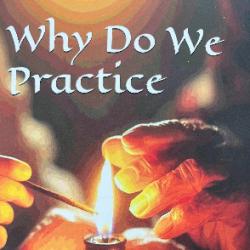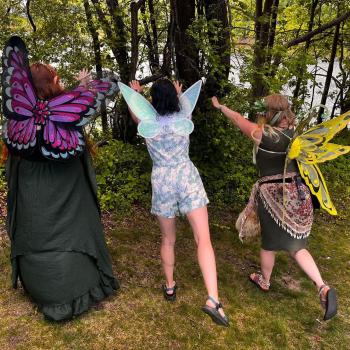Being a librarian is sometimes like being a coven leader. People have certain expectations of you, what you do, and what you can do for them. I can’t tell you the number of times people have said to me, “Oh, you’re a librarian? You must be really good at trivia.” I’m invoking Dwight Schrute here when I say, “False.” My response to that has always been: “I don’t know a lot of things but I can teach you how to find just about anything.” Snagging a Trivial Pursuit game win has never been in my cards but I know how to work a search engine, damnit.
The Degree of My Gardnerian Knowledge
I once thought my High Priest and High Priestess knew everything there was to ever know about Gardnerian Wicca. It took me a while to realize that was unreasonable because it isn’t possible to know everything about anything. Information constantly evolves, as do spiritual practices and traditions. My roles as librarian and Third Degree High Priestess do not prevent me from not knowing shit. In fact, I have a front-row seat to seeing just how much I have left to learn.
“All that I know is that I know nothing” is a shortened paraphrase attributed to Socrates (Plato, Apology 21d). It’s a phrase that I’m becoming more intimate with as it applies to my career and spirituality. Before initiation, it didn’t occur to me that each of the three Gardnerian degrees are different ways of experiencing the tradition. I thought that degree progression simply indicated that a person knew more than they did before. Progressing through the degrees felt like the goal even though my coven leaders repeatedly said otherwise. I figured it was easier for them to say that since they were already Third Degree. However, hindsight and experience has taught me they were right the whole damn time.

Additional Responsibility Doesn’t Mean Greater Connection
It’s possible that you might learn new things at each Gardnerian degree. It’s also quite possible that a person can have a fully developed and meaningful relationship with the tradition at First Degree. Some people choose to never progress beyond a certain degree but that doesn’t make them any less of an initiate. No matter if you are a First or a Third Degree, you are a Priest/ess/x/ex in our tradition. Your responsibilities may shift if you choose to pursue the “High” degrees but additional responsibilities do not equate to a greater connection. What you make of your connection to your spiritual practice is solely in your hands. No degree can give it to you.
If I could go back and have a chat with First Degree Ash then I’d tell her to slow down and savor the moment. An enthusiasm for learning drove me in the beginning. However, it’s the connection to my covenmates, not the degree or any knowledge, that drives me now.
The Degree of my Librarian Knowledge
Before COVID hit, two librarians and I were planning our instructional goals for the year. Because the majority of our classes are taught to intro courses, we chose to focus on tailoring our instruction to beginner researchers. We could place emphasis on how to narrow down a research topic, where to search for information, or how to create really good keywords. Before you can walk you must learn to crawl, right? That was our thinking, anyway.
We also thought about what research would look like in upper level college courses. We figured we could teach them good research habits now and then build on those concepts over the next three years of their college career. The reality, though, is that we usually don’t meet with the same students from year to year. So, some of our students will have previous experiences with us to work from and others will not. Instead, we decided to shift our goal to where we can make the most impact: in our “one-shot” classes.
One-shot classes are those where you only have “one shot” to meet with a class and somehow teach everything the professor wanted you to teach in the class time frame. Students sometimes reach out to me on their own for research assistance, though. In each of these scenarios, I approach the teaching opportunity as a one-shot even if it “officially” isn’t. This way, I can focus on the quality of the research session instead of how many sessions I have.
In nearly every class or one-on-one research session I’ve facilitated, I’ve learned something new from my students. I treat them like the experts on their subjects and assignments. My job is to simply connect them to the information they want by giving them the tools they need to find it. My goal is to hand them the tools they need to be confident in their own abilities to do research and analyze sources. Being a coven leader is very much like that – it’s my job to connect my students to the information and experiences they need to grow. It is not my duty to tell them how to interpret their experiences.
The Paradox of Coven Leadership
Leading a coven can sometimes be like putting on a one-shot class. As a coven leader, you try to think of what will have the most impact on your students within a certain time frame (like a ritual). Many Gardnerians I know put a tremendous amount of care and effort into training their students. Those same individuals place quality over quantity when it comes to numbers of students and subjects they cover.
Much like librarianship, leading a coven requires skill and patience. Coven leadership can look like different things to different people, particularly Gardnerians. Some of us lead covens at Second Degree and others at Third. It’s not important to focus on why that’s the case but, instead, to focus on what that means. It suggests that what it takes to lead a coven isn’t necessarily tied up with a person’s degree as much as their traditional knowledge and leadership skills. Just because a person is a Third Degree does not mean they will make good coven leaders. And just because a person is a Third Degree does not mean they have a greater relationship to the tradition than a First Degree.

Who’s really teaching whom in a coven?
When I first began leading a coven, I didn’t yet understand what it would mean to take on that responsibility. Initially, my energy was directed toward passing the tradition as I was taught. I was focused on teaching what I knew instead of building upon what my students already knew. There’s a lot of knowledge to be passed around the coven that doesn’t always come from the coven leaders, though. While our students may not have the same knowledge we have of the tradition, they can have an equal knowledge of something else. We should celebrate that, and take advantage of it.
I now better understand where I exist on the knowledge scale. I know what I was taught and I know what I’ve experienced. What I don’t know is greater than those two things combined. I exist as both the teacher and the student. I exist in the liminal space of Knowing and Unknowing. No degree will ever change that.
Follow me on Instagram @thegardnerianlibrarian














